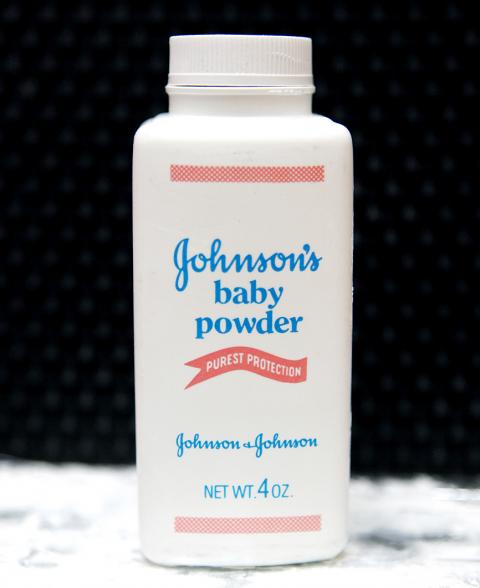Johnson & Johnson (J&J) has been hit with a US multimillion-dollar jury verdict for the fourth time over whether the talc in its baby powder causes ovarian cancer when applied regularly for feminine hygiene.
A St Louis, Missouri, jury on Thursday awarded US$110.5 million to Lois Slemp, 62, of Wise, Virginia, who was diagnosed with ovarian cancer in 2012. She blames her illness on her use of the company’s talcum powder-containing products for more than 40 years.
Besides Slemp’s case, three other jury trials in St Louis reached similar outcomes last year, awarding the plaintiffs US$72 million, US$70.1 million and US$55 million, for a combined total of US$307.6 million.

Photo: AP
The company said its product is safe and it plans to appeal the latest verdict, as it has the other three.
Johnson & Johnson also has had some legal victories, including in March when a St Louis jury rejected the claims of a Tennessee woman with ovarian and uterine cancer.
Also, two cases in New Jersey were thrown out by a judge who said the plaintiffs’ lawyers had not presented reliable evidence that talc leads to ovarian cancer.
The next baby powder trial is next month in St Louis and is to be followed by another in July in California.
Investors do not seem worried that J&J is in financial trouble, even though the company faces an estimated 2,000 similar lawsuits.
J&J shares fell US$0.62 to US$123.1 in late-afternoon trading on Friday.
J&J, the world’s biggest maker of healthcare products, brings in about US$72 billion a year selling prescription drugs, medical devices, diagnostic equipment and consumer products ranging from baby shampoo and Aveeno skin care items to Tylenol pain reliever and Band-Aids.
Because of its size and diversified product lines, J&J is sued frequently and investors do not panic when it loses product liability lawsuits, so its stock price rarely drops much after losses. Also, the company clearly intends to keep fighting lawsuits alleging its iconic baby powder is not safe, rather than settling suits at this point.
Talc is a mineral that is mined from deposits around the world, including the US. The softest of minerals, it is crushed into a white powder. It has been widely used in cosmetics and other personal care products to absorb moisture since at least 1894, when Johnson & Johnson’s Baby Powder was launched, but it is mainly used in a variety of other products, including paint and plastics.
Like many questions in science, there is no definitive answer. Finding the cause of cancer is difficult. It would be unethical to do the best kind of study, asking a group of women to use talcum powder on their genitals and wait to see if it causes cancer, while comparing them with a group who did not use it.
While ovarian cancer is often fatal, it is relatively rare. It accounts for only about 22,400 of the 1.7 million new cases of cancer expected to be diagnosed in the US this year.
Factors that are known to increase a women’s risk of ovarian cancer include age, obesity, use of estrogen therapy after menopause, not having any children, certain genetic mutations and personal or family history of breast or ovarian cancer.

SEMICONDUCTORS: The German laser and plasma generator company will expand its local services as its specialized offerings support Taiwan’s semiconductor industries Trumpf SE + Co KG, a global leader in supplying laser technology and plasma generators used in chip production, is expanding its investments in Taiwan in an effort to deeply integrate into the global semiconductor supply chain in the pursuit of growth. The company, headquartered in Ditzingen, Germany, has invested significantly in a newly inaugurated regional technical center for plasma generators in Taoyuan, its latest expansion in Taiwan after being engaged in various industries for more than 25 years. The center, the first of its kind Trumpf built outside Germany, aims to serve customers from Taiwan, Japan, Southeast Asia and South Korea,

Gasoline and diesel prices at domestic fuel stations are to fall NT$0.2 per liter this week, down for a second consecutive week, CPC Corp, Taiwan (台灣中油) and Formosa Petrochemical Corp (台塑石化) announced yesterday. Effective today, gasoline prices at CPC and Formosa stations are to drop to NT$26.4, NT$27.9 and NT$29.9 per liter for 92, 95 and 98-octane unleaded gasoline respectively, the companies said in separate statements. The price of premium diesel is to fall to NT$24.8 per liter at CPC stations and NT$24.6 at Formosa pumps, they said. The price adjustments came even as international crude oil prices rose last week, as traders

SIZE MATTERS: TSMC started phasing out 8-inch wafer production last year, while Samsung is more aggressively retiring 8-inch capacity, TrendForce said Chipmakers are expected to raise prices of 8-inch wafers by up to 20 percent this year on concern over supply constraints as major contract chipmakers Taiwan Semiconductor Manufacturing Co (TSMC, 台積電) and Samsung Electronics Co gradually retire less advanced wafer capacity, TrendForce Corp (集邦科技) said yesterday. It is the first significant across-the-board price hike since a global semiconductor correction in 2023, the Taipei-based market researcher said in a report. Global 8-inch wafer capacity slid 0.3 percent year-on-year last year, although 8-inch wafer prices still hovered at relatively stable levels throughout the year, TrendForce said. The downward trend is expected to continue this year,

Taiwan Semiconductor Manufacturing Co (TSMC, 台積電), which supplies advanced chips to Nvidia Corp and Apple Inc, yesterday reported NT$1.046 trillion (US$33.1 billion) in revenue for last quarter, driven by constantly strong demand for artificial intelligence (AI) chips, falling in the upper end of its forecast. Based on TSMC’s financial guidance, revenue would expand about 22 percent sequentially to the range from US$32.2 billion to US$33.4 billion during the final quarter of 2024, it told investors in October last year. Last year in total, revenue jumped 31.61 percent to NT$3.81 trillion, compared with NT$2.89 trillion generated in the year before, according to